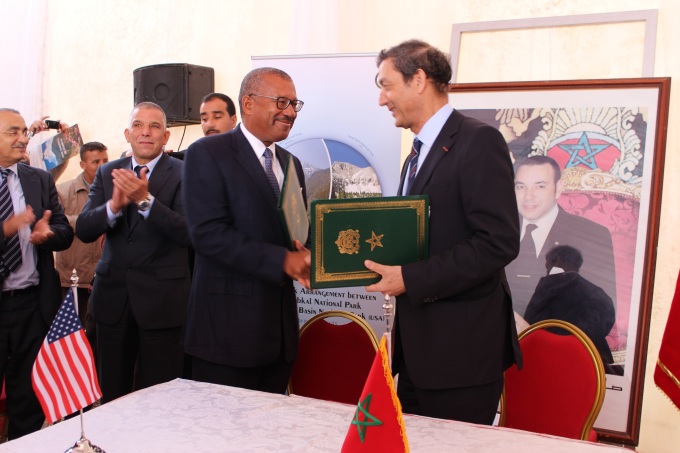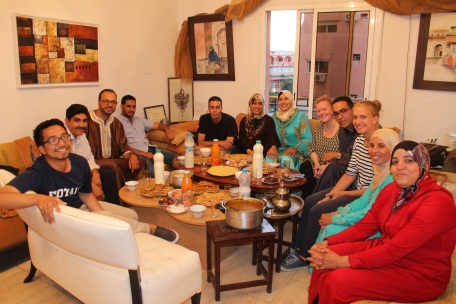By Ramzi Talbi
29/06/2016
My passion for the outdoors and for the protection of the environment drove me to apply for my second Patagonia Environmental Internship. This is an amazing program that allows us at Patagonia to leave our regular roles and work for the environmental group of our choice for up to two months while continuing to earn our paycheck and benefits. In my opinion, the hardest part of the application process for this program was to find the right group to work with based on what everyone’s interest. My interest for my first environmental internship was about marine ecosystem protection. I worked with amazing people at the Hawaii Wildlife Fund on the Sea Hawksbill recovery project in the town of Paia in Maui. Aloha to all my Hawaiian friends! My interest for my next environmental internship was about terrestrial ecosystem protection, especially reforestation and sustainable development. First, I couldn’t decide between Morocco and France as a destination, but as I started my search online for environmental groups in both countries, I started leaning toward Morocco as I was lucky to run across the High Atlas Foundation online and learned about their mission. Kamal Akaya the volunteer coordinator was awesome and quick in responding to my emails and made sure to send me the approval letter on time for my application.
High Atlas Foundation (HAF) is a US 501(C) (3) and Moroccan non-profit organization, based in Marrakech, founded around the spirit of the Peace Corps in 2000 and is now headed by former Peace Corps volunteer Yossef Ben Meir. The HAF main office is conveniently located in downtown Marrakech in a residential apartment building. HAF is run by a collection of Moroccan and international staff, interns and volunteers.
HAF focuses on grassroots development in disadvantaged Moroccan communities and develops projects by working with communities to identify their greatest needs and build self-reliant development skills through a participatory approach. HAF has implemented projects in sustainable agriculture, namely tree and plant nurseries through the entire agriculture development cycle, organic certification, processing, technical training and exportation.
HAF has a lot to be proud of:
- HAF planted more than one million and half trees impacting more than five thousand marginalized rural families. Now the group is engaged in a one Billion Tree Campaign. HAF built its reputation around distributing trees throughout the High Atlas Mountains of the Kingdom of Morocco. They do this by establishing tree nurseries and equipping locals with tools and resources to improve their financial status
- HAF addresses local environmental concerns and empowers youth to preserve their natural environment and adopt life-long behaviors such as recycling and waste management
- Tons of almonds and walnuts have been certified as organic for export at an increased profit for farmers
- HAF has also been successful in addressing other development issues in education, clean water systems, and the empowerment of women and youth.

Interns at HAF
My job at HAF started in May 2016 at the end of the planting season. During the planting season HAF distributed tree saplings to communities and organized reforestation events in the High Atlas Mountains. That’s why I switched from working on the reforestation project to working on spreading the word about the organization through working on social media: writing blogs, taking pictures for social media projects, and as an intercultural facilitator assisting visiting groups to HAF’s projects through translation…
My first day at HAF’s office, I walked into a workshop about sustainability and project planning presented to nursery caretakers and HAF staff members lead by Mark Apel, an Area Extension Agent in Community Resource Development with the University of Arizona Cooperative Extension in southern Arizona. Mark is implementing programs in land use planning, sustainable development, small acreage landowner assistance, and renewable energy education. I had the chance to meet most of HAF’s staff and volunteers during this workshop and learned about Mark Apel’s one month volunteer experience with HAF.
I enjoyed going out into the field to some of the most remote areas in Morocco and being a part of historical events, such as the sister park arrangement between the Great Basin National Park in Nevada, USA and the Toubkal National Park in Morocco signed by the US Ambassador to Morocco Dwight Bush and the High Commissioner for Water and Forest for mutual collaboration and the sharing of best practices on park management.

Sister park arrangement between the Toubkal National Park and the Great Basin National Park Nevada, USA
In the field, I assisted Amina El Hajjami, Project Manager in the Al Houz region. The field visits mainly entailed inspecting HAF’s project sites like nurseries, making reports about the progress of the projects and taking pictures. Field visits were also a chance for HAF’s staff to reconnect and check in with the local communities and lead workshops for rural cooperatives in the High Atlas Mountains,and especially women cooperatives.
I enjoyed our morning meetings over mint tea in the HAF salon, where Dr. Yossef would check in with everyone on his staff on their projects and share fun stories. We also gathered in the salon for lunch prepared by Atika, using locally sourced vegetables, fruits, and meat. This is a great way to foster staff bonding and be responsible toward the environment. This work environment made me appreciate the family atmosphere of HAF’s office. The break schedule had to change during the fasting month of Ramadan, but we had the chance to gather around for a group Iftar at the office and around Tanjiya out in the open air after work.

Group Iftar -Breaking fast during Ramadan- HAF’s office
My overall time was quite enriching and I gained a lot of practical experience, which will help me in my future work endeavors. My internship with HAF allowed me to travel through rural Morocco and meet some of amazing people. Berbers in the High Atlas Mountains are very hospital, welcoming and generous, despite the everyday challenges that face them.
Finally, the staff dedication to HAF’s mission was inspiring. The HAF staff and volunteers come from all different countries and disciplines, which make for a dynamic working environment and align well with the organization’s mission. They all share the concern and interest in making the world a better place to live in.
To learn more about my site visits please read my previous blog posts: Wool dyeing using plants, Boston students visit HAF, and Building a Cabin in Ourika.









